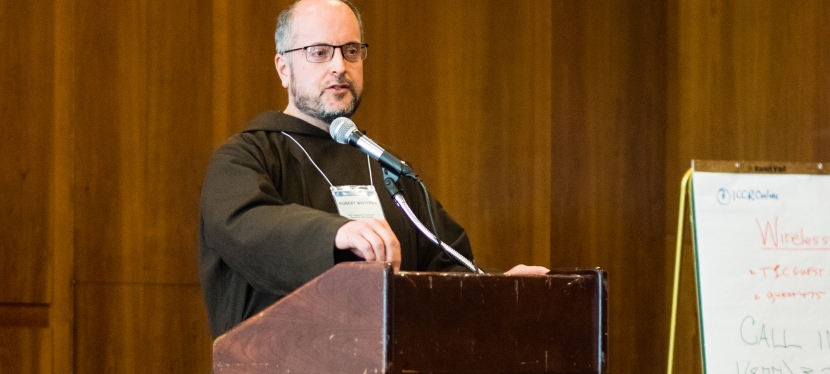This past week, four from SGI participated in ICCR‘s Spring Conference: Sr. Ruth Battaglia, C.S.A., Chris Cox, Frank Sherman, and Friar Robert Wotypka, O.F.M., Cap. We will report back what we heard and learned in a variety of ways in the coming weeks– here on the blog, at our May member meeting, to name but two channels. To lead off, we want to share the contribution of one of our members: Robert was asked to deliver some remarks in the Interfaith Session during the conference’s first day.
I begin by living out my desire to be inclusive and to acknowledge my theological, my cosmic presupposition maybe, by sharing the best definition of the Franciscan movement that I ever heard. I don’t remember who said it, but it is this: “The Franciscans are the Protestants who never left the Church.” So I am one of you.
And that’s relevant for our purposes here because of the movement’s first days – which could have gone differently than they did. Saint Francis of Assisi formed a new way of living out the Gospel, he wrote a Rule and he took his Rule to Pope Innocent III, who gave it verbal approval. To study the context of pope’s decision is to know that he preferred to have Francis within the Church, advocating for change and introducing these new things and shaking things up, than to banish him and treat him as an outsider. Isn’t that a starting point of the ICCR? That it’s better that we sit down together and work things out than to separate from each other in this work?
The heart of the Gospel as I have been formed to hear and proclaim it – and none of this is original – is to build up the Reign of God. What is that? I have best heard this defined as God’s rule working in human relations – and what defines God’s rule? These values: Peace, Freedom, Justice, Sister/Brotherhood. That’s what the Gospel is all about, that is how Jesus lived. So before there was a rule, before Saint Francis, before Jesus proclaimed the Reign of God, there was the Covenant.
And what is a covenant? A covenant is a way for two unequal parties to enter into and sustain a relationship. And I think about the work of ICCR, as I am slowly coming to understand it, and I come to see it as a covenantal work. ICCR does not have the voice, the resources, the pull of the parties we’re engaging with. We are equal in dignity, equal in potential, equal before the law … but we are not equal in resources or influence. And I say this out of my first direct experience of dialogue with a corporation. A company rep told us on a conference call, referencing a Greenhouse Gas reduction regime that we were advocating his company enter into, that no other of his investors was coming to the company about this.
What did that show? For me it felt to me that this company rep was showing us mercy, which is the fuel of the work of the Reign of God. Mercy, as I have heard it defined, is to meet people where they are, be ready to offer your gifts, and to be ready to respond to the gifts of others. And that is how this rep met us and greeted our work.
Which brings me to another Francis, a 21st century Francis, Pope Francis, and his vision and desire that the Catholic Church be the Church of Mercy for the world, which above all points to above all point to and to carry on the mission of Jesus, who Pope Francis calls “the face of God’s mercy.” Pope Francis loves three words – he’s a Catholic, he likes Trinitarian imagery – and he loves these three words: mercy, encounter, and conversion.
And I see these words, these values, these energies, building up the mission and the work of ICCR, and I feel so grateful. Encounter requires collaboration, I continue to be astonished by the profound and peaceful encounters that occur here between parties with different pre- suppositions. Encounter: encounter is the presupposition of collaboration, and here we are, doing collaborate work to build up peace, freedom, justice, sister/brotherhood. And conversion – conversion says we don’t take small steps, we don’t fiddle around the edges, we see and we say: things are not as they could be, things are not as they should be. Pope Francis calls this “not as the should be” “the cry of the Earth and the cry of the poor.”
Pope Francis reminds us, or awakens us, to the fact that “purchasing is always a moral and not just an economic choice,” he writes, this also from his encyclical Laudato Si that “…we still lack the culture needed to confront …” the crises that are afflicting life on earth.” He says, “We lack leadership capable of striking out on new paths and meeting the needs of the present with concern for all and without prejudice towards coming generations.” I consider this forum, these engagements, this ministry of ICCR, the very place where such leaders can be and are being formed. And I give thanks to God for the chance to walk with you in your work. I close the way Pope Francis closed his encyclical on care for creation, Laudato Sí: “Let us sing as we go. May our struggles and our concern for this planet never take away the joy of our hope.”


I appreciate these opening remarks from
Robert
In Joyful Service
Ruth Geraets, PBVM
1500 N. 2nd Street
Aberdeen SD 57401-1238
605-229-8346 – office
605-229-8563 – fax
http://www.presentationsisters.org
LikeLike